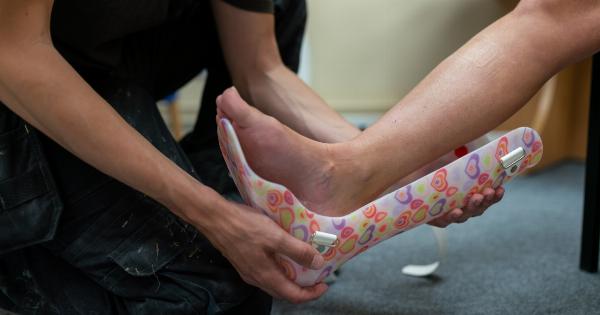Carrying extra weight can have a significant impact on various parts of the body, including the feet. Excessive weight puts additional stress on the feet, which can lead to a wide range of foot problems and discomfort.
In this article, we will explore the effects of carrying extra weight on the feet and discuss some preventive measures that can help alleviate these issues.
1. Plantar Fasciitis
One of the most common foot problems associated with excess weight is plantar fasciitis. This condition occurs when the thick band of tissue that runs across the bottom of the foot, called the plantar fascia, becomes inflamed.
The added weight increases the strain on the plantar fascia, leading to pain and stiffness in the heel area.
2. Flat Feet
Carrying extra weight can also contribute to the development of flat feet or fallen arches. The arches of the feet help distribute the body’s weight evenly while walking or standing.
However, excessive weight can cause the arches to collapse, leading to a flat foot. Flat feet can result in pain, instability, and an abnormal walking gait.
3. Arthritis
Obesity and carrying extra weight can increase the risk of developing arthritis in the feet. The excess pressure on the joints can wear down the cartilage, leading to pain, stiffness, and inflammation.
Arthritis can affect any joint in the foot, including the ankle, toes, and midfoot.
4. Stress Fractures
Being overweight puts additional stress on the bones of the feet, increasing the risk of stress fractures. A stress fracture is a small crack in the bone caused by repetitive stress or overuse.
Excess weight puts more pressure on the bones, making them more susceptible to these painful fractures.
5. Corns and Calluses
Carrying extra weight can lead to an increased occurrence of corns and calluses on the feet. These are areas of thickened and hardened skin that develop as a response to friction and pressure.
The extra weight on the feet can cause friction against the shoes, leading to the formation of corns and calluses.
6. Foot and Ankle Swelling
Excessive weight can also contribute to foot and ankle swelling, a condition known as edema. The increased load on the feet can inhibit proper blood circulation, resulting in fluid retention and swelling.
Swollen feet and ankles can be uncomfortable and may also cause difficulty in finding well-fitting shoes.
7. Heel Spurs
Heel spurs are bony growths that can develop on the underside of the heel bone. Carrying extra weight increases the pressure on the heel, leading to the formation of these protrusions.
Heel spurs can be extremely painful and may require medical intervention for relief.
8. Increased Risk of Foot Injuries
Individuals with excess weight are more prone to foot injuries such as sprains and fractures. The added weight can make the feet more unstable and vulnerable to twisting and tripping.
Additionally, the impact from falls or missteps can be more substantial due to the extra load, potentially leading to severe injuries.
9. Decreased Mobility
Excessive weight can decrease overall mobility and make it harder to engage in physical activities. Limited mobility can further contribute to weight gain, creating a vicious cycle.
Being less active also affects foot health, as decreased movement can weaken the foot muscles and lead to other associated issues.
10. Increased Pain and Discomfort
Carrying extra weight on the feet can simply result in increased pain and discomfort. The additional pressure and strain can make it challenging to stand, walk, or engage in regular daily activities.
The constant discomfort can negatively impact quality of life and overall well-being.
Preventive Measures
While losing weight is the most effective way to alleviate the detrimental effects on the feet, there are several preventive measures that individuals can take:.
1. Choose Proper Footwear
Wearing supportive and properly fitting footwear is crucial for individuals carrying extra weight. Shoes with good arch support, cushioning, and a wide toe box can help reduce strain on the feet and alleviate associated problems.
2. Gradual Weight Loss
If overweight or obese, gradual weight loss should be the goal. Rapid weight loss can also lead to foot issues, so it is essential to lose weight in a healthy and sustainable manner with proper nutrition and exercise guidance.
3. Strengthen Foot Muscles
Regular foot exercises and stretches can help strengthen the muscles and improve foot stability. Simple exercises like toe curls, heel raises, and ankle rotations can be beneficial in maintaining foot health.
4. Avoid Prolonged Standing or Walking
Individuals with excess weight should avoid prolonged periods of standing or walking, as it can exacerbate foot problems. If necessary, frequent breaks and sitting down can help alleviate the strain on the feet.
5. Manage Foot Hygiene
Proper foot hygiene is essential for avoiding infections and other foot-related complications. Regularly washing and thoroughly drying the feet, keeping the nails trimmed, and using moisturizer can help maintain healthy feet.
6. Seek Medical Intervention
If experiencing persistent foot pain or any of the mentioned foot issues, it is crucial to seek medical intervention. A healthcare professional specializing in foot health can provide accurate diagnosis and recommend appropriate treatments.
Conclusion
Carrying extra weight can have a significant impact on foot health and lead to various foot problems.
The increased strain on the feet can result in conditions such as plantar fasciitis, flat feet, arthritis, stress fractures, corns, and calluses, among others. To prevent and alleviate these issues, it is crucial to choose proper footwear, aim for gradual weight loss, strengthen foot muscles, avoid prolonged standing or walking, and practice good foot hygiene.
Seeking professional help is also essential for accurate diagnosis and appropriate treatments. By taking proactive measures, individuals can improve foot health and overall well-being.






























